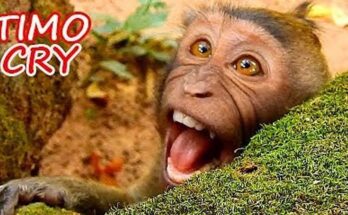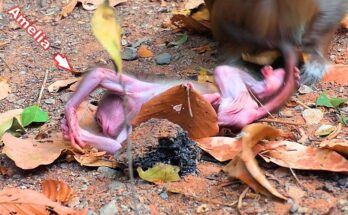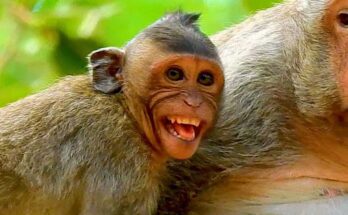In the quiet corners of the jungle, where the trees sway with the wind and sunlight dances through the leaves, a painful story unfolds between a mother and her tiny baby. Lucie, a small and fragile baby monkey, should be embraced with care and love. But lately, her life has been filled with confusion, rejection, and tears — all at the hands of the one who should protect her most, her mother Luna.
Lucie begins her morning clinging tightly to her mother’s chest, just as she has done every day since birth. She is still dependent, still learning the ways of the wild. Her little belly growls with hunger, and she instinctively reaches for milk. But today, like the days before, Luna reacts harshly. She shifts her body away, pushing Lucie’s head aside with a rough motion.
The baby monkey whimpers softly, then cries louder when she’s denied again. Her cries are heartbreaking — sharp, high-pitched sobs that echo through the trees. She tries again and again to latch onto her mother for the comfort and nourishment she needs. But Luna has changed. She no longer responds with affection. Instead, she blocks Lucie with her arms, sometimes shoving her hard enough to make her fall.
Other monkeys in the troop glance over, some curious, others indifferent. In the wild, such behavior is not always rare. Mothers may wean their babies abruptly, especially when food is scarce or stress is high. But for Lucie, it’s not just weaning — it’s emotional and physical mistreatment.
As the day goes on, Lucie’s condition grows worse. Tired and hungry, she trails behind her mother, sobbing and reaching up whenever Luna stops to rest. At one point, Luna grabs Lucie’s arm and pulls her away roughly, leaving the baby stumbling backward and hitting the ground with a soft thud. Lucie wails in pain and shock, her tiny body trembling.
Despite the harsh treatment, Lucie doesn’t give up. Her little heart still longs for love, for connection, for the warmth of the mother she once knew. Every cry she lets out is a plea — not just for food, but for comfort.
Luna, however, seems distant. She grooms herself and forages with the others, acting as though Lucie’s cries are nothing but noise. Even when Lucie approaches and tries to hug her, Luna brushes her off coldly.
By afternoon, Lucie is exhausted. Her cries have turned into soft whimpers. Her limbs are weak, and her eyes are heavy with sadness. She settles at the base of a tree, lying alone, watching her mother disappear into the branches above. Her little chest rises and falls with tired breaths, and her face is still damp with tears.
This is the heartbreaking side of wild life — where not every baby receives the love it needs. For Lucie, each day has become a struggle not just to eat, but to feel loved. And though she continues to cry, it remains uncertain whether those cries will ever be answered.


